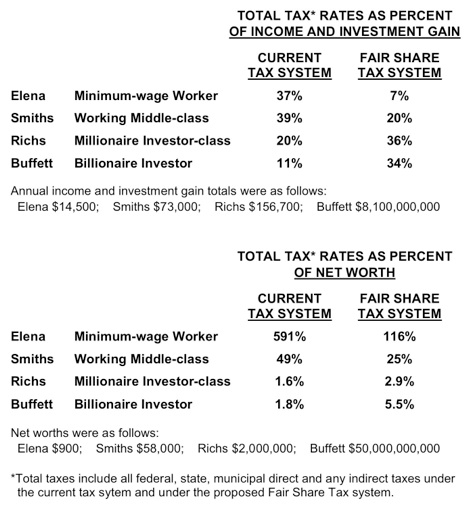WHAT IF THE FAIR SHARE TAX REFORM PLAN WAS ADOPTED?
ADVANTAGES OF THE PROPOSED "FAIR SHARE" TAX SYSTEM
(OVER THE CURRENT TAX SYSTEM) For explanation and justification of the following, see the Fair Share Tax Reform Essay.
FAIRNESS AND RELIEF FOR THE BELEAGUERED WORKING-POOR & MIDDLE-CLASS
-
•Taxes more proportional to the extent to which the taxpayer has likely profited from the services governments provide
-
•Taxes more proportional to ability to pay
-
•Reduction in taxes for about 80% of taxpayers
-
•Increased wages for about 90% of workers from mandated increases in the minimum and moderate wages coupled with the elimination of the employer portion of the Social Security tax
-
•Reduction in taxes for small businesses
-
•Reduction in the now-ballooning income and wealth disparities
-
•Reduced poverty
-
•End the enormously regressive "property" taxes (on many times the net worth of the middle class and a small fraction of the net worth of the very wealthy)
-
•Increased ability for young families and lower middle-class to gain a financial foothold
-
•Reduced hardship to the the poor and middle class during recession through keeping taxes proportional to ability to pay (mainly through ending property and sales taxes)
-
•Increased ability for all citizens to realize their potential through education
STRONGER ECONOMY
-
•Stronger economy through the average person being able to share in the overall growth of the economy, better educated citizens, better government, and improved economic infrastructure
-
•More credit available to the private sector from reduced government borrowing
-
•Reduction in debt burden on future generations
-
•Reduction in distorted tax-based incentives that reward investment over work
-
•Eliminate tax incentives to retain investments with capital gains regardless whether the investment remains a "good" one
-
•Rebalancing of economic activities of work, consumption, and saving-investment through elimination of market-distorting tax incentives for investment
-
•Reduced need for artificially low, bubble-inducing interest rates to bolster economy as consumption supported instead by more even income and wealth distribution
-
•Reduction in frequency and sizes of investment bubbles
-
•Reduction in frequency and sizes of recessions
-
•Reduced chances of spiraling into deeper recessions by keeping taxes proportional to ability to pay during early recessions (automatic near elimination of all taxes when laid off in a recession)
-
•Less fluctuation in consumer spending, the driving force for the economy and responsible for about two-thirds of the GDP
-
•Elimination of corporate taxes (human owners pay taxes on corporate profits) attracts corporations from the world over
-
•Elimination of corporate taxes eliminates costly business decisions made only to reduce corporate tax bill
-
•Reduced unemployment
-
•Reduced incentives to retain poor investments due to tax consequences
-
•Stronger, more prosperous nation
IMPROVED GOVERNANCE
-
•Reduction in the vicious cycle of increased wealth and increased political power for the wealthy minority
-
•Increased revenue to fund new national priorities (education, research, clean energy, economic infrastructure, international aid)
-
•Better government through a better educated electorate
-
•More understandable, transparent system, so more taxpayers feel they and everyone is paying their fair share
-
•Increased and more stable government revenues from stronger economy, fewer recessions
-
•Balance budget. No deficit spending. Reduced national debt, state and municipal borrowing.
-
•Reduced tax payments needed to pay interest on government debt
-
•Enormously simplified tax system
-
•Fewer man-hours and less money spent by taxpayers to file taxes
-
•Less government expenditure to collect taxes
-
•Universal citizen contribution to any war effort though automatic War Tax
-
•Improved likelihood of a strong economy and prosperity for future generations
PUBLIC HEALTH AND THE ENVIRONMENT
-
•Prices better reflect the cost of certain activities to government and society through increased targeted excise taxes
-
•Certain harmful behaviors (e.g. smoking, fossil fuel use) are discouraged through excise taxes
-
•Reduced economic inequality associated with (at all levels of society) improved health, life expectancy & societal cohesion; and reduced teenage pregnancy, infant mortality, psychiatric illness, substance abuse, and homicide rates
-
•Behaviors society would like to promote (e.g. saving for education, health-promoting behaviors, retirement) are encouraged through unified, tax-free accounts
-
•Improved health and environment
-
•Reduced government expenditures from improved health and environment
-
•Less suffering throughout the world
DISADVANTAGES OF PROPOSED TAX SYSTEM
-
•Some taxpayer attempt to legally or illegally avoid the net-worth tax, as they do now with the income tax.
-
•There will be some capital flight, where wealthy citizens and residents hide their money offshore; however this will be small since the best financial opportunities are in the US, the tax will be little more than most pay in investment fees, and safeguards against this can be written into the legislation. For instance, those renouncing their citizenship to flee with the money they made here (thanks to the economic infrastructure we all pay for with our taxes) should pay a penalty of one-half their net worth and a lifetime ban on re-entering the country. (link)
-
•Increased disclosure of personal financial information, namely net worth, to the government. However, this can be limited to the 12% needing to pay the tax by having others figure their net worth on a worksheet that is not submitted with the return.
-
•Increased excise taxes are generally regressive, but this is outweighed by overall reduction in taxes for poor and middle class.
-
•Slightly reduced investment by wealthy, but this likely balanced by increased savings and investment by middle class and working poor.
-
•An endless din of erroneous claims (by funny men in tricornered hats) that "the wealthiest 5% already pay 60% of the taxes" and of cries of "confiscatory" taxation.
IF EVERYONE PAID THEIR FAIR SHARE, THE TAXES OF WORKING POOR AND MIDDLE-CLASS HOUSEHOLDS COULD BE REDUCED BY THOUSANDS, WE COULD PAY DOWN THE NATIONAL DEBT, THE ECONOMY WOULD FLOURISH, AND EVERYONE, THE WORKING-POOR, THE MIDDLE-CLASS, AND THE WEALTHY WOULD BENEFIT. THE USA COULD REMAIN A FORCE FOR GOOD IN THE WORLD.
CLICK TO SEE WHY THE WEALTHY SHOULD WANT TO PAY MORE TAXES UNDER THIS FAIR SHARE PROPOSAL
HOW WOULD TAX RATES SHIFT UNDER THE FAIR SHARE PLAN?
For the current and for my proposed "Fair share" tax systems, I calculate tax rates by adding together all the federal, state, and local taxes (including indirect taxes) paid in a year and dividing the result by the two true measures of a household's ability to pay and the extent to which a household has profited from government services: 1) their annual income including investment gains and 2) their total wealth (net worth):
IMPORTANT NOTE: Both tables show Total Tax Rates. For instance, under the proposed "Fair Share" system the Smiths would pay no Net-worth Tax, but as shown in the right column of the bottom table, their other taxes (federal, state, and municipal income taxes and some excise taxes) amount to 25% of their net worth (down from 49% under the current system.




BUT WOULD THE FAIR SHARE TAX PLAN COLLECT ENOUGH TO PAY FOR GOVERNMENT SERVICES?
Under this Fair Share Tax and Spending proposals, the National Debt would gradually be paid off.
Under the Fair Share Tax proposal total calculated revenue for federal, state, and municipal governments would be $6146 billion for 2014. Going forward federal revenue would average 18.8% of GDP, 10% higher than the 17.1% (2001-10) under the Bush tax cuts, and equal to that of the Clinton years. If we join the Fair Share Tax reforms with the phased-in Spending Reforms (judiciously cutting $2 for every $1 tax increase) proposed on the Debt and Spending page and leave both the Fair Share Tax and Spending Reforms on autopilot, we would:
-
•Have federal budget surpluses by 2025,
-
•Pay off the National Debt entirely by 2040 (if we wanted to).
-
•All (federal, state, municipal) government spending would gradually drop from 40% of GDP now to 26% by 2040. See the Debt and Spending page for details and a link to a spreadsheet and graphs.
-
•If, as expected, the tax reform makes the economy flourish, the national debt could be paid off even faster.
Elena, the Smiths and the Richs are typical, hypothetical taxpayers in 2006 or 2007. Warren Buffett's taxes are based on the personal tax information he disclosed for 2006 and his company's annual report. The tax system has not been changed in any significant way since then, except perhaps that an increasing tax burden has been placed on the working poor and middle class in the form of increased sales and property taxes. For all four, their financial situations and tax calculations are outlined on the Four Taxpayers page, and in the Fair Share Tax Reform Essay.
CRITICAL PAGES: HOME ROMNEY TAXES SUMMARY IMAGINE! HELP US!.
SEE FULL NAVIGATION MENU BENEATH PHOTOS AT TOP OF PAGE

COPYRIGHT - FAIR SHARE TAXES - ALL RIGHTS RESERVED
FAIR SHARE TAX REFORM - A comprehensive tax reform plan for federal, state and local governments, that reduces total taxes on the working-poor and middle-class by thousands each year, encourages stable economic growth, vastly simplifies our tax laws, and slashes the national debt.
CONTACT ME: fairsharetaxes@att.net







